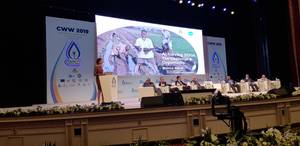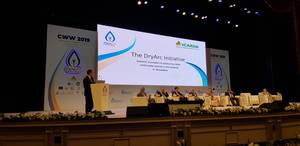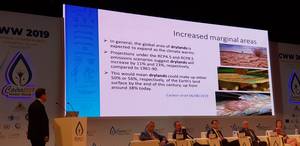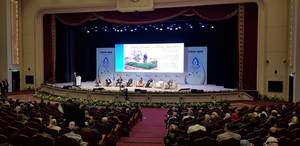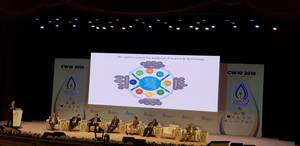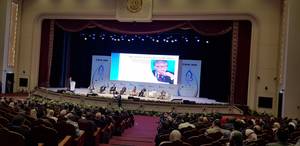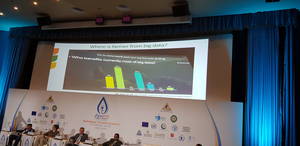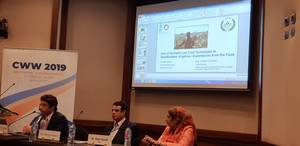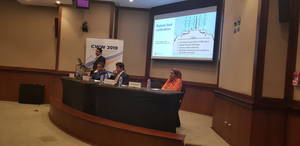ICARDA participates in the 2nd Cairo Water Week
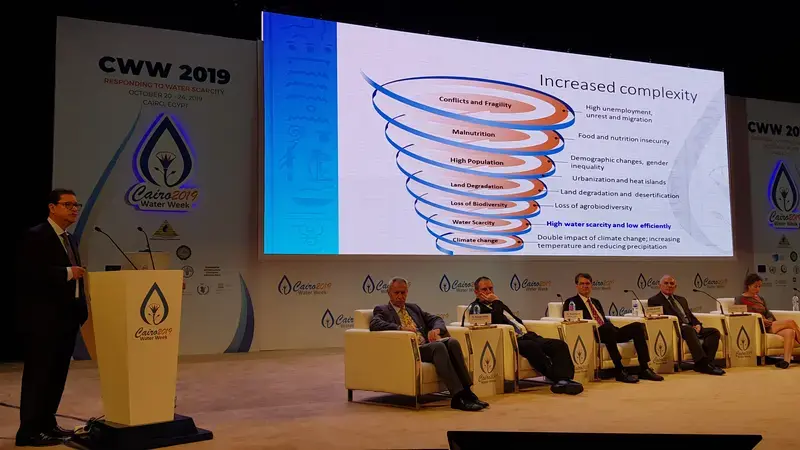
Cairo, Egypt, October 20-24, 2019. The 2nd Cairo Water Week (CWW) aimed at translating the vision created during the 1st CWW into steps towards best practices and suitable implementation plans. Driven by the success of the1st Cairo Water Week, it has been decided to make the CWW an annual event.
CWW ensures knowledge transfer and how it can be acquired through successful public or private business models, political opportunities and obstacles, and capacity building needs.
Plenary Session 1: Achieving the SDGs under Water Scarcity
The panelists of this session brought broad perspectives to respond to the many water-related linkages across all the SDGs. In the Near East and North Africa Region, there is one major resource whose scarcity would prove the largest obstacle to the achievement of the SDGs: Water. In this region, agriculture is the major consumer of water, and makes it is easy to realize the link between SDG6 – to ‘Ensure availability and sustainable management of water and sanitation for all’ – and the SDG2 on food security, which in turn links with the SDG1 on poverty reduction.
It is evident through its links to food security, nutrition and health, rural development and growth, and the environment, that agriculture is a major driver in the attainment of the SDGs. Meanwhile, further links can also be seen with energy where the nexus between food, energy and water is one of the classic examples of water dependency. Similarly, water is strongly related to SDG11, which focuses on sustainable cities and communities.
The list could continue to show the many water-related linkages across all of the SDGs, and it is with this awareness of strong dependency on water that this session has been elaborated. Water scarcity, in fact, poses an enormous challenge in the achievement of the SDGs and more broadly the Agenda as a whole.
- How should this challenge be addressed?
- Which ‘measures’ need to be implemented, or to be enforced, in order to accelerate the achievement of the SDGs under this particularly constraining condition?
The panelists addressed different domains, spanning urban development, energy and agriculture, along with different spheres of interventions, including policy, institutions, investments and practices. Some evidence at country-level were illustrated as well.
-
Ms. Bianca Nijhof, Director of the Netherlands Water Partnership, board member of the Amsterdam
Unlock the potential of Science and Technology International Water Week, The Netherlands
- H.E. Mr. Mohamed AbdEl Aty, Minister of water resources and irrigation, Egypt
- Eng. Yousef Al Aitan, Ministry of the Environment and Water Resources, Jordan – ‘Sustainable Development Platform of Water & Sanitation in Jordan’
- Eng. Eweda Morshed, Chairman of the Department of Energy, Abu Dhabi, United Arab Emirates
- Dr. Felix Reinders, President of the International Commission on Irrigation and Drainage (ICID)
Accelerate CGIAR efforts - Mr. Aly Abousabaa, Director-General ICARDA, ‘DryArc Initiative: Systemic innovation to achieve the SDGs under water scarcity in the drylands’
- Mr. Manuel Sapiano, Chief Executive Officer at The Energy and Water Agency, Malta
Technical Session 8: Water productivity as the cornerstone of water-limited food production.
The session explored the crop water productivity gaps that could be bridged (ex. for the basis of our food basket), then analyzed the economic water productivity in light of recent social and institutional changes (ex. issues that affect WP such as access to water and water rights, sustainability, equity, changes along the value chain, the impact of food waste on WP), and finally explored how to inform the society on actions needed addressing the consumer and societal perceptions of the water needs for producing food and discussed the pros and cons of available indicators (ex. water footprint).
- Mr. Pasquale Steduto (FAO/ICARDA)
"There are different dimensions of Water Productivity (WP): biophysical, economic, environmental, and social WP. Also, there are different scales from farm to country. Also, the improvement of WP can be approached not only from agriculture and water management, but also from governance, food loss and waste etc." - Mr. Issam Nofal: "Near-East North Africa (NENA) region has large semi-arid and arid lands, hence water productivity improvement is critical for this region especially under the increasing demands, more frequent droughts, and climate change".
- Kibrom Abay (IFPRI), ‘Options for improving economic irrigation water efficiency for sustainable agricultural development.’
"NENA region is water scarce and is projected to face economic loss from climate-related water scarcity (6-14% of GDP) by 2050. By 2050, half the population and 45% of GDP in NENA are at risk due to water stress. In addition, the water productivity in NENA is lower than global average, and 82% of wastewater is not recycled. Therefore, there are potentials to improve water productivity in the region. Agriculture consume much of world’s and NENA region’s water resources, and improvement in irrigation efficiency may result in $10 billion welfare gain. That is why focus on irrigation efficiency is important. Options to improve water use efficiency and productivity include irrigation system modernization, improve agricultural productivity, crop pattern shift, integrated production system (e.g. aquaculture + agriculture), integrated approaches (food, energy and irrigation), and use of non-conventional water. From policy perspectives, recommendations include raising awareness and empowering water users, improved water governance, designing incentives to increase water productivity and reduce water wastage, and reforming water and land policies."
- Mr. Amgad Elmahdi (IWMI), ‘Water Productivity at basin scale with water accounting and ICT Applications’
"There are projections on the increase of demand and decrease of yield due to climate change. Various approaches to improve WP exist, such as increase of yield, increase of profit, and decrease of water consumption. Also to estimate WP, water accounting (WA) can be a useful tool. It is also important to consider energy requirement in addition to water consumption. Some of the methods to improve WP includes shift in cropping pattern, improvement of irrigation efficiency, use of non-conventional water, contouring, water harvesting, etc. These methods can be at different scale, e.g. market improvement, farm management improvement, institutional arrangement (e.g. to set incentives for people to save water). Integrated approach in terms of sectors and scales are needed."
-
Mr. Atef Swelam (ICARDA), ‘Improving Water Productivity: options at farm level.’
"To improve the current water productivity, there are many methods to improve water productivity, such as raised bed to reduce evaporation (E), mole drain to improve salinity of the soil, irrigation infrastructure improvement, multi layer crop production (e.g. trees and vegetables) to increase income and reduce Evaporation by shading from trees, mulching to reduce evapo-transpiration (ET), and deficit irrigation that improves income by improving harvest quality. In the ongoing work on measuring ET and use of big data big data is often not yet utilized by/for small scale farmers and we have to make effort on it"
Technical Session 47: Supporting Smallholders for Resilient Food Security System
Conveners: World Food Prgramme (WFP) Egypt + Ministry of Agriculture and Land Reclamation
Smallholders of Upper Egypt rural communities are vulnerable for many reasons, with heavy reliance on meagre income they generate from fragmented areas of land being the most prominent. The session presented what the Ministry of Agriculture and Land Reclamation has done in partnership with the WFP to support these smallholders. It presented the different interventions under this support and how these interventions helped smallholders increase their production, and thus income, and enhance the efficiency of managing their water and land resources.
The speakers included:
- Moderator: Dr. Ali Hozayen, Ministry of Agriculture and Land Reclamation.
- Dr. Ithar Khalil, WFP.- Models for successful smallholders’ support and resilience building and experiences for improved irrigation management
- Mohamed Ghareeb, e-Commerce Senior Manager www.efinance.com.eg
e-finance was founded in 2005 as the first fin-tech company in Egypt, e-finance story began when the Egyptian Government launched an initiative to build and operate and manage the government Financial payment hub (Payment & Collection). - Hussein Ghanem, Non-financial Services, SME group, National Bank of Egypt - Innovations for financial inclusion in agriculture and irrigation
At the National Bank of Egypt, it is embedded in the Small and Medium Enterprise group strategy to design its products and services to be customer centric with a detailed understanding of economic verticals to design holistic developmental finance solutions to those target sectors. Those solutions are enabling, if not designed specifically for, the integration of individual participants and micro enterprises into the value chain. Localizing the value chain when possible by supporting economically sustainable enterprises. NBE relies on strategic partnerships to deliver an all-inclusive package to the small holder farmer community that combines those custom financial solutions with non-financial services like the technical support that WFP has already begun providing all the way to entrepreneurial and educational support that would enable farmers and other members from the community to start and grow their businesses that would complement the main activity of the community which is of course Agriculture.
Technical Session 14: Innovative solutions to improve agricultural production in marginal environments
- Dr Dionysia Angeliki Lyra, Halophyte Agronomist, International Center for Biosaline Agriculture (ICBA), Dubai United Arab Emirates
- Dr Khalil Ammar, Programme Leader Sustainable Agricultural Resources Management, ICBA
Dedicated Social media for the Water Week
- Twitter: @ICARDA
- Facebook : https://www.facebook.com/icarda/
- Water Week Twitter account: @cairowaterweek
- Water Week Facebook page: https://www.facebook.com/cairowaterweek
- Water Week YouTube channel: CairoWaterWeek
- Water Week Instagram account: https://www.instagram.com/cairowaterweek/
#CairoWaterWeek_2019 @EUinEgypt @CGIAR #OneCGIAR@ICARDA Mr. Aly Abousabaa, Director General ICARDA: "Drylands could make up either 50% or 56%, respectively, of the Earth’s land surface by the end of this century, up from around 38% today." https://t.co/ALWSYFx0CR pic.twitter.com/HVFvt50nuG
— ICARDA (@ICARDA) October 20, 2019
#CairoWaterWeek_2019 @ICARDA @CGIAR #OneCGIAR Mr. Aly Abousalaam:: "The Dry Arc Initiative is to accelerate the scaling-up of the combined knowledge of ICARDA, IWMI, ICRISAT, IITA, IFPRI, ILRI, and CIMMYT and the technology development & transfer of the NARS Research centers" pic.twitter.com/bkO5cOwrbt
— ICARDA (@ICARDA) October 20, 2019
#CairoWaterWeek_2019 #CGIAR #OneCGIAR @ICARDA
— ICARDA (@ICARDA) October 22, 2019
Technical Session 8: “Water productivity as the cornerstone of water-limited food production” - Dr Atef Swelam (ICARDA), ‘Improving Water Productivity: options at farm level’ pic.twitter.com/U7CrKhutNH
Positive announcement!!!
— OUMAR AL-FAROUKH Brahim Mahamat (@brah_alfaroukh) October 22, 2019
E.U will be launching a multi annual flagship program called EU for water in Egypt with a total indicative budget of 20M€ in grant. The implementation is expected before the end of this year. #CairoWaterWeek_2019 pic.twitter.com/ysoHhlmjTS
#CairoWaterWeek_2019 @ICARDA @CGIAR #OneCGIAR 21/10 (PS2): Dr. Elco Van Beek, Team leader Study of the Grand Ethiopian Renaissance Dam (GERD) impact on Egypt: "If filling coincides with drought there will be an average reduction of agricultural production in Egypt of 1472 M USD" pic.twitter.com/X5c67tOkSu
— ICARDA (@ICARDA) October 22, 2019

